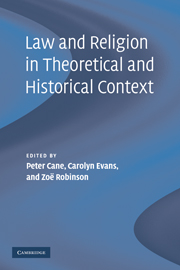Book contents
- Frontmatter
- Contents
- List of Contributors
- 1 Introduction
- 2 The moral economy of religious freedom
- 3 Understanding the religion in freedom of religion
- 4 Why religion belongs in the private sphere, not the public square
- 5 Pluralism in law and religion
- 6 The influence of cultural conflict on the jurisprudence of the religion clauses of the First Amendment
- 7 From Dayton to Dover: the legacy of the Scopes Trial
- 8 A very English affair: establishment and human rights in an organic constitution
- 9 Days of rest in multicultural societies: private, public, separate?
- 10 Australian legal procedures and the protection of secret Aboriginal spiritual beliefs: a fundamental conflict
- 11 Secular and religious conscientious exemptions: between tolerance and equality
- 12 Law's sacred and secular subjects
- 13 Freedom of religion and the European Convention on Human Rights: approaches, trends and tensions
- Index
- References
5 - Pluralism in law and religion
Published online by Cambridge University Press: 07 July 2009
- Frontmatter
- Contents
- List of Contributors
- 1 Introduction
- 2 The moral economy of religious freedom
- 3 Understanding the religion in freedom of religion
- 4 Why religion belongs in the private sphere, not the public square
- 5 Pluralism in law and religion
- 6 The influence of cultural conflict on the jurisprudence of the religion clauses of the First Amendment
- 7 From Dayton to Dover: the legacy of the Scopes Trial
- 8 A very English affair: establishment and human rights in an organic constitution
- 9 Days of rest in multicultural societies: private, public, separate?
- 10 Australian legal procedures and the protection of secret Aboriginal spiritual beliefs: a fundamental conflict
- 11 Secular and religious conscientious exemptions: between tolerance and equality
- 12 Law's sacred and secular subjects
- 13 Freedom of religion and the European Convention on Human Rights: approaches, trends and tensions
- Index
- References
Summary
Introduction
The image of state law as an institutionally separate, ideologically neutral and normatively superior entity which orders our society is no longer tenable. Over the past few decades a large number of critiques have established that law is embedded in and indissociable from its cultural context, that far from being neutral it is ideologically grounded in politically weighted presuppositions, and that its once-absolute superiority is counteracted by the existence of plural normative environments within which contemporary subjects of law are situated.
In contemporary Western nations, religion is often regarded by law as a matter of private freedom, as though it occupies a space which is other to law, the state, and our public sphere. In this, the ‘West’ is not itself unified: within the Anglosphere, for instance, Britain has an established church, while varying doctrines of separation between church and state or freedom of religion operate in the United States, Canada, Australia and New Zealand. There are also differences in whether political discourse is inflected with, or avoids, explicitly religious considerations.
Recently, religion has encroached upon the ‘public’ consciousness in ways which two decades ago might have seemed implausible. The causes and manifestations of this encroachment are undoubtedly complicated. In Australian domestic politics, for instance, family-oriented politicians espousing conservative Christian ethics (though sometimes denying formal affiliation with Christian organisations) have been elected to state and federal parliaments.
- Type
- Chapter
- Information
- Law and Religion in Theoretical and Historical Context , pp. 72 - 99Publisher: Cambridge University PressPrint publication year: 2008
References
- 4
- Cited by



